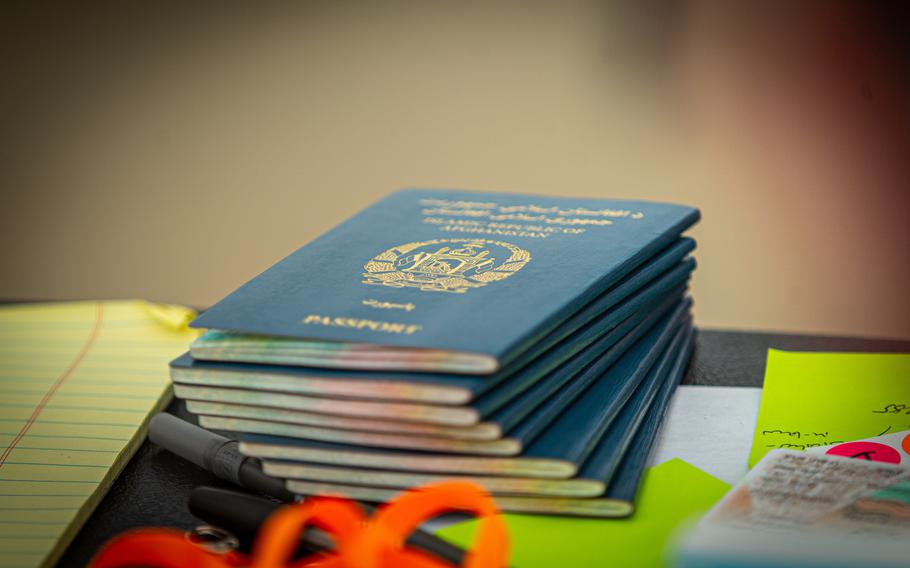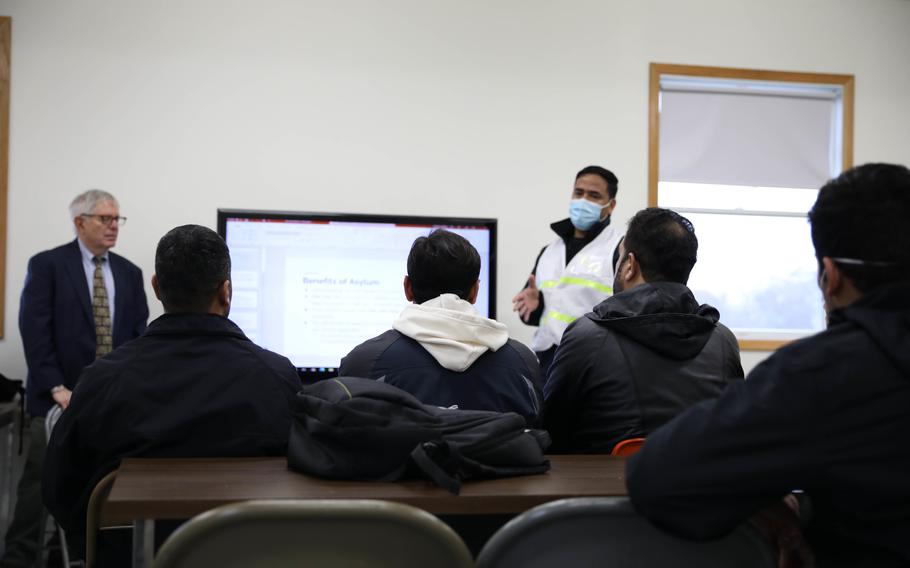
Afghan civilian passports await vetting at Marine Corps Base Quantico, Va., in 2021. The military created the Afghan Special Immigrant Visa support team to help Afghans who faced threats from the Taliban and others after working with the U.S. (Brian Bolin Jr./U.S. Marine Corps)
The Pentagon is asking for proposals that would improve a chronically slow visa process for Afghan interpreters and others who worked alongside American forces during the 20-year war in Afghanistan.
A Defense Department notice last week asked companies for ideas on how they could help verify past employment for Afghans seeking Special Immigrant Visas, many of whom worked for contractors that no longer exist or didn’t maintain adequate employment documentation.
The process has left applicants who face threats from the Taliban in limbo, say military veterans and legal advocates.
The recent notice solicits companies willing to serve as contractors or subcontractors for the DOD Afghan Special Immigrant Visa support team, or DAS-T.
The contract responsibilities would include operating a web portal where former employers can input applicants’ work histories, verifying information, identifying people with problematic records and researching difficult-to-verify cases.

Afghan evacuees attend a class Dec. 15, 2021, at Fort McCoy, Wis., on applying for asylum. The Defense Department now is asking companies to submit proposals on how they can help in verifying past employment for Afghans still seeking Special Immigrant Visas. (Caitlin Wilkins/U.S. Army)
While some veterans and advocates cautiously welcome the Pentagon notice, they point out that the program has grappled with problems since its inception in 2021.
Challenges have included understaffing, delays and what they say is a disconnect between the U.S. military and the State Department.
“I myself am a little bit skeptical but hopeful that (the DOD notice) was made to specifically address some of the shortcomings of the program,” said Kim Staffieri, co-founder of the Association of Wartime Allies, which assists Afghan SIV applicants.
The DAS-T program so far has processed 8,890 applicants, DOD spokesman Lt. Cmdr. Tim Gorman said Friday.
It was founded originally under the name Project Rabbit, after the State Department asked the military in July of 2021 to help verify that SIV applicants worked for DOD contractors.
Lack of documentation became a problem early on, as did cultural differences and details like spelling discrepancies in names, resulting in numerous rejections.
“The system required a specific kind of cleanness that just wasn’t present in so many of the cases that SIV would be really needed for,” said Rob Hargis, former chief operating officer of the contracting company IAP.
Hargis said he saw dozens of applications get rejected because of differences in how Afghans and Americans write dates.
When the U.S.-backed government in Kabul fell in the summer of 2021, Project Rabbit was an ad hoc effort without dedicated funding.
It was staffed by two DOD personnel who also had other duties, said a statement in June by Lt. Col. Rob Lodewick, Afghanistan spokesman for the Pentagon at the time.
The program was initially successful in matching thousands of applicants, internal documents from the time said. But Project Rabbit’s limitations soon became evident.
A program document obtained by the New York-based International Refugee Assistance Project in February 2022 noted that Project Rabbit could process only 100 cases per week, compared to a backlog of 30,000.
The DOD told Stars and Stripes that by February 2022, the easy verifications from large employers had been completed and more challenging cases with smaller employers remained.
About 160,000 applicants now are within the 13-step approval pipeline, the DOD said Friday.
The military’s notice envisions contractors handling about 400 to 500 SIV cases monthly, as well as 100 cases for Afghans applying through a different program.
This number may increase if more contractors that employed Afghans during the war support the military’s effort, said Gorman, adding their participation is voluntary.
Stephen Poellot, a founding member of IRAP, said the DOD goal is insufficient and the government should incentivize contractor participation.
“The big picture is that it looks like the need is exponentially larger than even this improved target that the DOD is setting in this anticipated workload,” Poellot said. “Every day, people are at risk.”
The military says that advocates overstate its role in the SIV process, which ultimately is the State Department’s responsibility.
“DOD’s role is limited to working with industry to verify, if possible, the employment of applicants who have not already provided employment letters to State,” Gorman said in an email.
Between 20,000 and 30,000 people are among the 160,000 visa applicants who fall into the category, Gorman said.
The State Department declined to speak on the record in response to questions about the SIV process, but in an emailed statement Thursday said it collaborates closely with the military on employment verification and that it has improved the SIV process over time.
But Navy veteran Catalina Gasper, like other advocates, veterans and contractors who spoke with Stars and Stripes, expressed frustration with State Department denials despite her efforts to verify employment through the military.
Gasper said she worked with the military to verify employment for 65 people she worked with while deployed to Afghanistan in 2018 and 2019.
Half of them were denied by the State Department because of “lack of qualifying employment,” as if they were unaware of all the casework she had submitted through the military, Gasper said.
“More than just adding people to the task, they need to fix the broken processes that are inhibiting valid cases from getting approved,” said Gasper, who suffered a traumatic brain injury after a Taliban attack while deployed to Afghanistan in 2019.
Otherwise, she said, “some of these Afghan allies will be lost to the United States forever. If not taken by Taliban brutality or starvation, then they will lose all faith in the United States.”